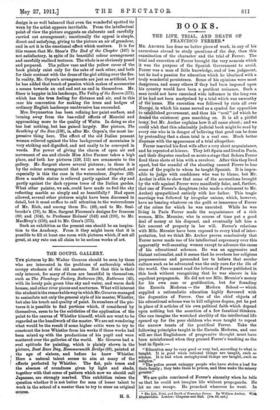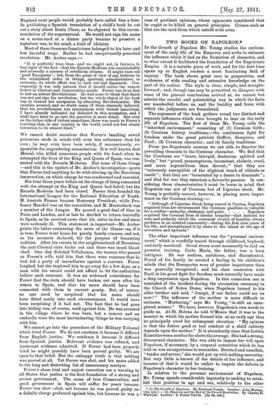BOOKS.
THE LIFE, TRIAL, AND DEATH OF FRANCISCO FERRER.*
Ma. ARCHER has done no better piece of work, in any of his excursions abroad to study questions of the day, than this examination of the character and the trial of Ferrer. The trial and execution of Ferrer brought the very nemesis which it was the purpose of the Spanish Government to avoid. Ferrer was a man of little knowledge, and of less judgment, but he had a passion for education which he idealized with a truly wonderful persistence. Some of his opinions were most dangerous, and many others if they had been imposed upon his country would have been a pestilent nuisance. Such a man could not have exercised wide influence in the long run if he had not been martyrized by a trial which was unworthy of the name. His execution was followed by riots all over Europe, in which his name served as a symbol for opposition to established government, and thus his " soul " (of which he denied the existence) goes marching on. It is all a pitiful irony, but Mr. Archer explains how it all came about; and we could swish that this admirably judicial book might be read by every one who is in danger of believing that good can be done by pretending that a sham trial is a real one. Much better dispense with the appearance of a trial altogether.
Ferrer married his first wife after a very short acquaintance, and he repented at leisure. They left Spain and lived in Paris, and their disputes reached so acute a stage that Senora Ferrer fired three shots at him with a revolver. After this they lived apart, but the scandal of the shooting caused Ferrer to lose some of the pupils to whom he taught Spanish. It is impos- sible to judge with confidence who was to blame, but Mr. Archer is able to show that some of the accusations brought by the wife against Ferrer were manifestly false, and, further, that one of Ferrer's daughters (who made a statement to Mr. Archer) sympathized entirely with her father. This tragic marriage was followed by irregular unions, which, however, have no bearing whatever on the guilt or innocence of Ferrer of the crime for which he was executed. While he was living in Paris Ferrer made the acquaintance of a rich woman, Mlle. Meunier, who in course of time put a good deal of money at his disposal, and eventually left him a fair amount of property in her will. Ferrer's relations with Mlle. Meunier have been exposed to every kind of inter- pretation, but we think Mr. Archer proves conclusively that Ferrer never made use of his intellectual supremacy over this apparently well-meaning woman except to advance the cause of his educational schemes. He was an aggressive and blatant rationalist, and it seems that he overbore her religious prepossessions and persuaded her to believe that secular culture such as he advocated was the only cure for the ills of the world. One cannot read the letters of Ferrer published in this book without recognizing that he was sincere in his repellent propaganda. He did not use Mlle. Meunier's money for his own ease or gratification, but for founding the Escuela Moderna — the Modern School — which supplied a rationalistic education highly flavoured with the dogmatics of Ferrer. One of the chief objects of his educational scheme was to kill religious dogma, yet he put in place of it articles of his own political faith which depend upon nothing but the assertion of a few fanatical thinkers. One can imagine the wretched sterility of the intellectual life opened up for the poor children who were taught to repeat the narrow tenets of the pontifical Ferrer. Take the following principles taught in the Escuela, Moderna, and one will see that Englishmen of progressive thought must have been misinformed when they praised Ferree teaching as the best in Spain :—
" Education may be very good or very bad, according to what is taught. It is good when rational things are taught, such as science. It is bad when metaphysical things are taught, such as religion."
" The police arrest unhappy people who have stolen a loaf for their family ; they take them to prison, and thus make the misery greater."
We are quite convinced of Ferrer's sincerity when he tells us that he could not imagine life without propaganda. He let no one escape. He preached wherever he went. In • The Life, Trial, and Death of Francisco Ferrer. By William Archer. Witt Illustrations. London : Chapman and Hall. [10s. 6d. nat..]
England most people would probably have called him a bore In publishing a Spanish translation of a child's book he cut out a story about Santa Claus, as he objected to this recom- mendation of the supernatural. He would not sign his name on a menu-card at a dinner party because to preserve a signature was, to his mind, a kind of idolatry.
Most of these tiresome fanaticisms belonged to his later and less harmful stage. Earlier he had unequivocally preached revolution. Mr. Archer says :— "It is perfectly true, then—and we ought not, in fairness, to lose sight of the fact—that the Escuela Moderna was unmistakably and avowedly a nursery of rebellious citizens. It might turn out `good Europeans ' ; but, from the point of view of any believer in the established order of things, spiritual, administrative, or economic, its whole effort was to turn out bad Spaniards. Con- sequently it was only natural that it should excite the utmost horror in Clerical and Conservative minds. Ferrer was from first to last an ardent Revolutionist. He had come to think that Spain was not yet ripe for revolution; but the whole object of his work was to correct her unripeness by educating Revolutionists. His enemies averred, and no doubt many of them sincerely believed, that his revolutionism was synonymous with violent anarchism. I have already indicated my disbelief in this accusation, and I shall have later to go into the question in more detail. But even on the hither side of violent anarchism, there was much in Ferrer's teaching that, in any country in the world, could not but strain toleration to its utmost limit.'
We cannot doubt ourselves that Ferrer's teaching sowed poisonous seeds in minds with even less substance than his own ; he may even have been solely, if unconsciously, re-
sponsible for engendering assassination. It is well known that Morral, who killed numerous people with his bomb when he attempted the lives of the King and Queen of Spain, was con- nected with the Escuela Moderna. But none of these things —and this is the upshot of Mr. Archer's investigation—prove that Ferrer had anything to do with stirring up the Barcelona insurrection, on which charge he was condemned and executed.
His trial three years before on the charge of being connected with the attempt on the King and Queen had failed, but the Escuela Moderna had been closed. Ferrer then founded the International League for the Rational Education of Youth. M. Anatole France became Honorary President, while Pro- fessor Haeckel was on the committee and M. Maeterlinck was a member of the League. He passed a good deal of time in Paris and London, and at last be decided to return hurriedly to Spain, as he received news that his sister-in-law and niece were seriously ill. This statement is important—Mr. Archer prints the letter containing the news of the illness—as, if it is true, Ferrer went home for purely family reasons, and not, as his accusers declared, for the purpose of fomenting sedition. After his return to the neighbourhood of Barcelona the anti-Clerical riots broke out and there was much blood- shed. One day Soledad Villafranca, the woman who passed as Ferrer's wife, told him that there were rumours that he had led a party of incendiaries against a convent. Ferrer laughed, but she implored him to go away for a few days, as a man with his record could not afford to let the authorities believe such rumours. It was an awkward coincidence for Ferrer that the riots should have broken out soon after his return to Spain, and that his name should have been connected with them in current gossip. But, of course, no one need be surprised that his name should have fitted easily into such circumstances. It would have been surprising if it had not. The fact that be bad gone into hiding was, of course, used against him. He was arrested in the village where he was born, but a camera and an umbrella were the most incriminating things he was carrying with him.
We cannot go into the procedure of the Military Tribunal which tried Ferrer. We do not condemn it because it differed from English justice. We condemn it because it differed from Spanish justice. Relevant evidence was refused, and irrelevant evidence admitted. If Ferrer had been properly tried he might possibly have been proved guilty. We are open to that belief. But the unhappy truth is that nothing was proved at all. Yet Ferrer was shot, and his name added to the long and disturbing list of unnecessary martyrs. Ferrer's sham trial and unjust execution are a warning to all States that justice is the first foundation of a strong and secure government. The cause of true Conservatism and good government in Spain will suffer for years because Ferrer was shot—shot, not because he was proved guilty on a definite charge preferred against him, but because be was a man of pestilent opinions, whose opponents considered that he ought to be killed on general principles. Crimea such as that are the seed from which untold evils arise.











































 Previous page
Previous page